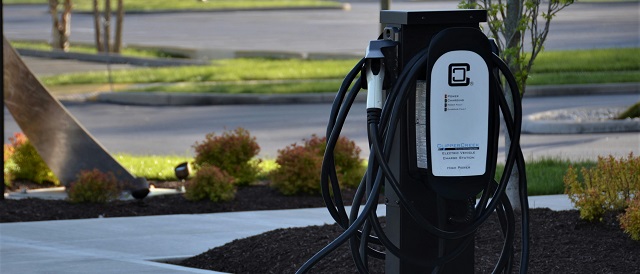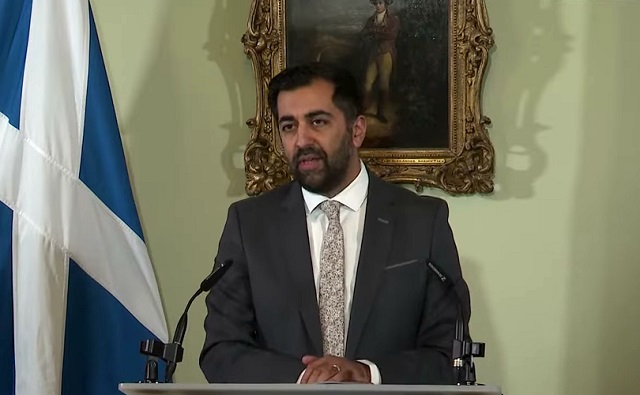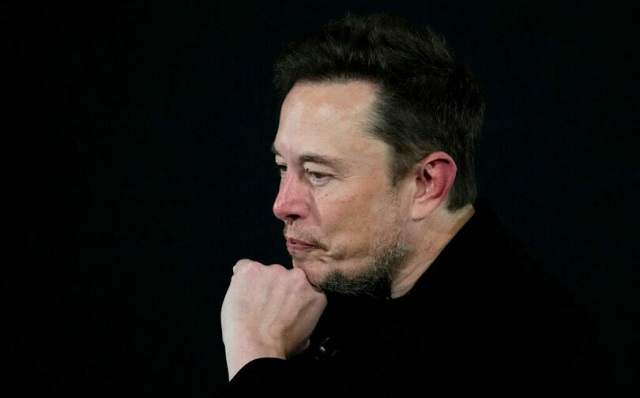Automotive
The EV ‘Bloodbath’ Arrives Early

 From the Daily Caller News Foundation
From the Daily Caller News Foundation
By David Blackmon
Ever since March 16, when presidential candidate Donald Trump created a controversy by predicting President Joe Biden’s efforts to force Americans to convert their lives to electric-vehicle (EV) lifestyles would end in a “bloodbath” for the U.S. auto industry, the industry’s own disastrous results have consistently proven him accurate.
The latest example came this week when Ford Motor Company reported that it had somehow managed to lose $132,000 per unit sold during Q1 2024 in its Model e EV division. The disastrous first quarter results follow the equally disastrous results for 2023, when the company said it lost $4.7 billion in Model e for the full 12-month period.
While the company has remained profitable overall thanks to strong demand for its legacy internal combustion SUV, pickup, and heavy vehicle models, the string of major losses in its EV line led the company to announce a shift in strategic vision in early April. Ford CEO Jim Farley said then that the company would delay the introduction of additional planned all-electric models and scale back production of current models like the F-150 Lightning pickup while refocusing efforts on introducing new hybrid models across its business line.
General Motors reported it had good overall Q1 results, but they were based on strong sales of its gas-powered SUV and truck models, not its EVs. GM is so gun-shy about reporting EV-specific results that it doesn’t break them out in its quarterly reports, so there is no way of knowing what the real bottom line amounts to from that part of the business. This is possibly a practice Ford should consider adopting.
After reporting its own disappointing Q1 results in which adjusted earnings collapsed by 48% and deliveries dropped by 20% from the previous quarter, Tesla announced it is laying off 10 percent of its global workforce, including 2,688 employees at its Austin plant, where its vaunted Cybertruck is manufactured. Since its introduction in November, the Cybertruck has been beset by buyer complaints ranging from breakdowns within minutes after taking delivery, to its $3,000 camping tent feature failing to deploy, to an incident in which one buyer complained his vehicle shut down for 5 hours after he failed to put the truck in “carwash mode” before running it through a local car wash.
Meanwhile, international auto rental company Hertz is now fire selling its own fleet of Teslas and other EV models in its efforts to salvage a little final value from what is turning out to be a disastrous EV gamble. In a giant fit of green virtue-signaling, the company invested whole hog into the Biden subsidy program in 2021 with a mass purchase of as many as 100,000 Teslas and 50,000 Polestar models, only to find that customer demand for renting electric cars was as tepid as demand to buy them outright. For its troubles, Hertz reported it had lost $392 million during Q1, attributing $195 million of the loss to its EV struggles. Hertz’s share price plummeted by about 20% on April 25, and was down by 55% for the year.
If all this financial carnage does not yet constitute a “bloodbath” for the U.S. EV sector, it is difficult to imagine what would. But wait: It really isn’t all that hard to imagine at all, is it? When he used that term back in March, Trump was referring not just to the ruinous Biden subsidy program, but also to plans by China to establish an EV-manufacturing beachhead in Mexico, from which it would be able to flood the U.S. market with its cheap but high-quality electric models. That would definitely cause an already disastrous domestic EV market to get even worse, wouldn’t it?
The bottom line here is that it is becoming obvious even to ardent EV fans that US consumer demand for EVs has reached a peak long before the industry and government expected it would.
It’s a bit of a perfect storm, one that rent-seeking company executives and obliging policymakers brought upon themselves. Given that this outcome was highly predictable, with so many warning that it was in fact inevitable, a reckoning from investors and corporate boards and voters will soon come due. It could become a bloodbath of its own, and perhaps it should.
David Blackmon is an energy writer and consultant based in Texas. He spent 40 years in the oil and gas business, where he specialized in public policy and communications.
Automotive
New Analysis Shows Just How Bad Electric Trucks Are For Business

 From the Daily Caller News Foundation
From the Daily Caller News Foundation
By WILL KESSLER
Converting America’s medium- and heavy-duty trucks to electric vehicles (EV) in accordance with goals from the Biden administration would add massive costs to commercial trucking, according to a new analysis released Wednesday.
The cost to switch over to light-duty EVs like a transit van would equate to a 5% increase in costs per year while switching over medium- and heavy-duty trucks would add up to 114% in costs per year to already struggling businesses, according to a report from transportation and logistics company Ryder Systems. The Biden administration, in an effort to facilitate a transition to EVs, finalized new emission standards in March that would require a huge number of heavy-duty vehicles to be electric or zero-emission by 2032 and has created a plan to roll out charging infrastructure across the country.
“There are specific applications where EV adoption makes sense today, but the use cases are still limited,” Karen Jones, executive vice president at Ryder, said in an accompanying press release. “Yet we’re facing regulations aimed at accelerating broader EV adoption when the technology and infrastructure are still developing. Until the gap in TCT for heavier-duty vehicles is narrowed or closed, we cannot expect many companies to make the transition, and, if required to convert in today’s market, we face more supply chain disruptions, transportation cost increases, and additional inflationary pressure.”
Due to the increase in costs for businesses, the potential inflationary impact on the entire economy per year is between 0.5% and 1%, according to the report. Inflation is already elevated, measuring 3.5% year-over-year in March, far from the Federal Reserve’s 2% target.
Increased expense projections differ by state, with class 8 heavy-duty trucks costing 94% more per year in California compared to traditional trucks, due largely to a 501% increase in equipment costs, while cost savings on fuel only amounted to 52%. In Georgia, costs would be 114% higher due to higher equipment costs, labor costs, a smaller payload capacity and more.
The EPA also recently finalized rules mandating that 67% of all light-duty vehicles sold after 2032 be electric or hybrid. Around $1 billion from the Inflation Reduction Act has already been designated to be used by subnational governments in the U.S. to replace some heavy-duty vehicles with EVs, like delivery trucks or school buses.
The Biden administration has also had trouble expanding EV charging infrastructure across the country, despite allotting $7.5 billion for chargers in 2021. Current charging infrastructure frequently has issues operating properly, adding to fears of “range anxiety,” where EV owners worry they will become stranded without a charger.
Automotive
Vehicle monitoring software could soon use ‘kill switch’ under the guise of ‘safety’

From LifeSiteNews
By Caryn Lipson
Ambiguity surrounds the definitions of ‘impairment’ and the consequent privacy implications of such technology, raising fears of government overreach and erosion of rights.
In the name of safety, the government has taken steps that critics say have denied citizens what used to be considered inalienable constitutional rights.
Citizens are concerned that their right to freedom of speech under the First Amendment is being denied, ostensibly, to keep citizens safe from “harmful misinformation,” and fear that the Second Amendment right to bear arms is being infringed upon to combat gun violence. Watchdogs further contend that citizens are being denied the Fifth Amendment’s protection against self-incrimination and the Sixth Amendment’s right to face one’s accuser when technology is used to gather evidence.
READ: Vietnam’s new biometric ID cards raise fears of privacy violations, data breaches
The fear now is that increased use of technology will soon mean an even greater loss of privacy and further erosion of the Fifth and Sixth Amendments, due to certain provisions in Joe Biden’s infrastructure bill which will soon become mandatory. Under the guise of keeping citizens safe by preventing drunk driving, it may amount to ceding the freedom to travel to government control.
H.R.3684 – Infrastructure Investment and Jobs Act
The infrastructure bill, HR. 3684, passed by both chambers of Congress and signed by Biden on November 15, 2021, includes a provision for several vehicle monitoring technologies to be installed in cars, which have recently or will soon be required in new vehicles, including technology to determine if a driver is drunk or impaired.
The Center for Automotive Research’s Eric Paul Dennis reviewed the bill and summarized “key sections.” Dennis, a senior transportation systems analyst, reviewed the section on “Drunk and Impaired Driving Prevention Technology” (HR 3684 Section 24220) and explained that Congress gave the NHTSA (National Highway Traffic Safety Administration) the role of determining exactly what this section means and how it will be implemented:
This provision directs NHTSA to issue a rule to require ‘advanced drunk and impaired driving prevention technology’ in new light vehicles.
- Congress tasked NHTSA with interpreting this law, including establishing the statutory meaning of ‘impaired.’
- The legislation directs NHTSA to adopt a new safety mandate by 15 November 2024 and begin enforcing it by September 2027 (at the latest) if this is feasible. [Emphases added.]
Impaired driving not defined
Others, such as Michael Satterfield, writing as The Gentleman Racer®, were more detailed in their review of the legislation. Satterfield poured through the 1,039-page infrastructure bill. He agreed that good roads, bridges, and safety are important to automotive enthusiasts, but wrote that he uncovered some concerning legislation “buried deep within HR.3684.” The legislation calls not only for changes in crash testing and advanced pedestrian crash standards but also for a “kill switch” to be standard for all new vehicles by 2026.
Satterfield explained that all new vehicles will be required to have passive monitoring systems for the driver’s behavior and an algorithm will determine if the driver is too impaired to operate the vehicle. If the algorithm decides that the driver is too impaired to operate the car, the program will have some means of taking control of the vehicle. But what constitutes impairment and what the program will actually do was not explained by the legislation, as Satterfield noted:
What is not outlined in the bill is what constitutes impairment, outside of the blood alcohol standard, how does the software determine the difference between being tired and being impaired? Passive blood alcohol testing won’t detect impairment from prescription painkillers or other narcotics.
The bill also doesn’t outline what happens when a vehicle detects a driver may be impaired other than that the system must ‘prevent or limit motor vehicle operation if an impairment is detected’ which is all well and good in a bar’s parking lot. But what will this system do if an ‘impairment is detected’ while traveling at 75 mph on the highway? [Emphasis added.]
Accused by your own car’s surveillance system
Satterfield’s greatest concern was the question of individual privacy that a vehicle that monitors the driver raises, including who will have access to the data, and other issues such as the right not to self-incriminate under the Fifth Amendment and the Sixth Amendment right to face your accuser.
He also expressed concern that most drivers will not be aware of the new technology until it affects them in some way:
Perhaps the most disturbing aspect of the legislation is the lack of detail. The main concerns expressed by many, including former U.S. Rep. Bob Barr, come down to privacy. Who will have access to the data? How long will it be stored? Will this capability be exploitable by third-party or government agencies to shut down vehicles outside of the function of preventing impaired driving?
Privacy concerns and the 5th Amendment’s right to not self-incriminate, and the 6th Amendment’s right to face one’s accuser, have already been used to challenge data collection from license plate readers and redlight cameras. Automakers have little choice but to comply with new federal mandates and the majority of consumers will likely be unaware of this new technology until it impacts them in some way. [Emphasis added.]
Freedom or control?
John Stossel recently interviewed former vintage race car driver Lauren Fix about what she believes are the implications of the soon-to-be-implemented impaired driving technology, as reported on FrontPage Magazine.
READ: High-tech cars are secretly spying on drivers, resulting in insurance rejections: NYT report
Fix pointed out that the algorithm cannot determine what exactly is happening in the car and with the driver and asks Stossel how much control over his life he is willing to give up:
Are you willing to give up every bit of control of your life? Once you give that up, you have no more freedom. This computer decides you can’t drive your vehicle. Great. Unless someone’s having a heart attack and trying to get to the hospital.
California, Fix pointed out, already requires vehicle software to limit excess speed to 10 miles over the limit, legislation about which Frontline News reported.
Fix also revealed to Stossel that some companies already collect and sell driver data and proceeded to outline further abuses that could occur as a result of computer surveillance technology, such as charging for mileage or monitoring your “carbon footprint” and deciding that you maxed out on your monthly carbon credits so you can’t drive anymore until the following month. Or perhaps the car won’t start because the software determines you may be on your way to purchase a firearm.
What about hackers?
Can hackers access a vehicle’s software and take control of someone’s car? This possibility is another worrying aspect of the infrastructure bill, which Frontline News will discuss in an upcoming report.
Reprinted with permission from America’s Frontline News.
-

 Agriculture21 hours ago
Agriculture21 hours agoFarming group accuses Canadian gov’t of trying to blame agriculture for ‘climate change’
-

 Opinion2 days ago
Opinion2 days agoDoes Scottish gov’t turmoil signal the end of the ‘green’ agenda’s stranglehold on Europe?
-

 Energy2 days ago
Energy2 days agoFresh Off Their Major Victory On Gas Export Terminals, Enviros Set Sights On New Target: Oil Exports
-

 Business2 days ago
Business2 days agoProposed changes to Canada’s Competition Act could kneecap our already faltering economy
-

 Business2 days ago
Business2 days agoEXCLUSIVE: US Is Failing To Counter Threat Of Chinese Land Ownership, Report Finds
-

 illegal immigration14 hours ago
illegal immigration14 hours agoNorthern border apprehensions highest in US history first 6 months of fiscal ’24
-

 illegal immigration15 hours ago
illegal immigration15 hours agoTerrorist watch list apprehensions at northern border continue to break records
-

 espionage10 hours ago
espionage10 hours agoEXCLUSIVE: House Committee To Investigate Spike In Chinese Illegal Immigration Following DCNF Report








